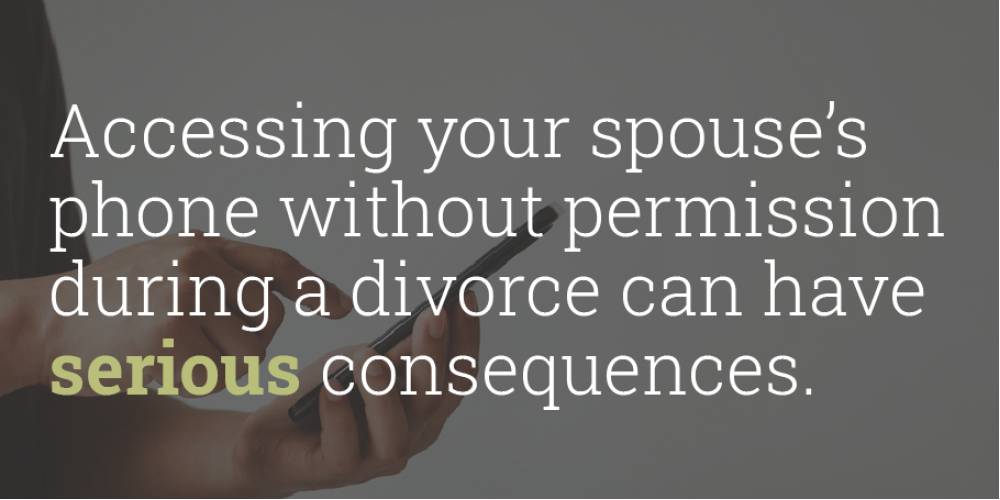630-462-9500
After Hour New Client Telephone Number 630-690-6077
1776 S. Naperville Road, Building B, Suite 202,
Wheaton, IL 60189
During a Divorce, Is Looking Through Your Spouse's Phone Illegal?
 During the divorce process, emotions run high, and suspicions may arise. It is not uncommon for people to wonder if it is legal to access their spouse's phone to gather evidence of an affair or even locate hidden assets. However, this question often leads to complicated legal and ethical considerations. For questions, concerns, or anything else related to your divorce, an experienced Illinois divorce lawyer can help ensure every decision you make is both legal and in your best interests.
During the divorce process, emotions run high, and suspicions may arise. It is not uncommon for people to wonder if it is legal to access their spouse's phone to gather evidence of an affair or even locate hidden assets. However, this question often leads to complicated legal and ethical considerations. For questions, concerns, or anything else related to your divorce, an experienced Illinois divorce lawyer can help ensure every decision you make is both legal and in your best interests.
What Is the Expectation of Privacy During a Divorce?
In most jurisdictions, people have a reasonable expectation of privacy, which extends to their electronic devices. This means that looking through someone's phone without their permission is typically considered a violation of their privacy rights. Even in a marriage, personal privacy remains protected under the law. In Illinois, privacy violations are taken seriously, and unauthorized access to someone's electronic device can potentially lead to criminal charges under the state's Computer Crime Prevention Law.
The specific rules about privacy during divorce may depend on factors such as who owns the device, whether both spouses have consented to share passwords, and whether there is an explicit agreement allowing access to the device. The Stogsdill Law Firm, P.C. can help clarify how privacy laws apply to your specific situation.
How Can an Attorney Help You Gather Evidence for a Divorce?
Attorneys are well-versed in discovery procedures and other legal tools that are used to uncover hidden assets or evidence of misconduct without violating your spouse's privacy rights. Some of the ways an attorney can provide assistance include:
-
Formal Discovery Requests: Discovery is a legal process that allows one party to formally request information or documentation from the other. During your divorce, your attorney may use this process to request financial records, bank statements, or phone logs directly from your spouse.
-
Subpoenas: Your attorney can issue these legally binding documents to third parties, like banks or employers, to obtain relevant records if your spouse will not cooperate.
-
Depositions: During a deposition, your attorney can question your spouse under oath. This process can be used to gather valuable information or clarify inconsistencies in your spouse's statements.
-
Forensic Investigations: In instances of suspected hidden assets or financial misconduct, your attorney can work with forensic accountants or technology experts to trace financial transactions, analyze digital records, and reveal concealed information.
By working with an attorney, you can ensure that the evidence is obtained in a legal and admissible manner. This avoids the potential risk of evidence being thrown out due to unlawful collection methods.
What Are the Legal and Ethical Consequences of Snooping?

Accessing your spouse's phone without permission during a divorce can have serious consequences. Doing so may violate state and federal laws, such as the Electronic Communications Privacy Act (ECPA), which protects against unauthorized access to electronic communications. In Illinois, these actions could also result in computer tampering charges under state law.
Beyond the legal penalties, any evidence obtained through unlawful methods is usually inadmissible in court. This means that even if you uncover incriminating evidence, the judge may refuse to consider it, which can potentially harm your case. Unethical behavior during a divorce can damage your credibility in the eyes of the court and can negatively influence decisions related to child custody or property division.
Are There Exceptions That Allow Access to Your Spouse's Phone?
While accessing your spouse's phone without permission is generally illegal, there are limited exceptions. These include:
-
Mutual Consent: If you and your spouse have agreed to share passwords or access each other's devices, you may be able to legally review their phone, as long as this agreement remains in place.
-
Court Orders: In some instances, a court may issue an order that allows you to access specific information from your spouse's phone or other electronic devices. For example, if there is evidence that your spouse is hiding assets or taking part in harmful activities, a judge may authorize a forensic investigation of their phone.
In these situations, it is essential to proceed carefully and consult with your attorney before taking any action. Attempting to access your spouse's phone without proper authorization can have significant legal consequences.
How Can You Protect Your Own Privacy During a Divorce?
Divorce is not only a time when people may feel tempted to snoop on their spouse, but it is also a time when their own privacy may be at risk. If you are concerned about your spouse attempting to access your personal information, there are steps you can take to protect yourself:
-
Change Passwords: Update passwords for your email accounts, bank accounts, social media profiles, and any other accounts that your spouse may be able to access. Use strong, unique passwords that are difficult to guess.
-
Enable Two-Factor Authentication: Many online services offer two-factor authentication, which adds an additional layer of security by requiring a second form of verification to log in.
-
Secure Your Devices: Lock your phone, tablet, and computer using a passcode or biometric authentication, such as fingerprint or facial recognition. Make sure to log out of shared devices when you are finished using them.
-
Avoid Shared Accounts: If you and your spouse share accounts, consider separating them during the divorce to preserve your financial and personal privacy.
-
Be Cautious with Communication: Be mindful of how and where you share sensitive information. For instance, avoid discussing private matters on shared devices or accounts that your spouse can access.
-
Consult a Lawyer: A divorce attorney can offer guidance on protecting your privacy and upholding your legal rights throughout the divorce process.
Contact a DuPage County Divorce Attorney
Navigating privacy issues during a divorce can be difficult, especially when emotions are high and trust has been broken. If you are considering divorce or have concerns about privacy, evidence collection, or other legal matters, contact the skilled Wheaton, IL divorce lawyers at The Stogsdill Law Firm, P.C. to discuss your case and learn more about how we can protect your rights. Call 630-462-9500 today to schedule a confidential consultation.




















